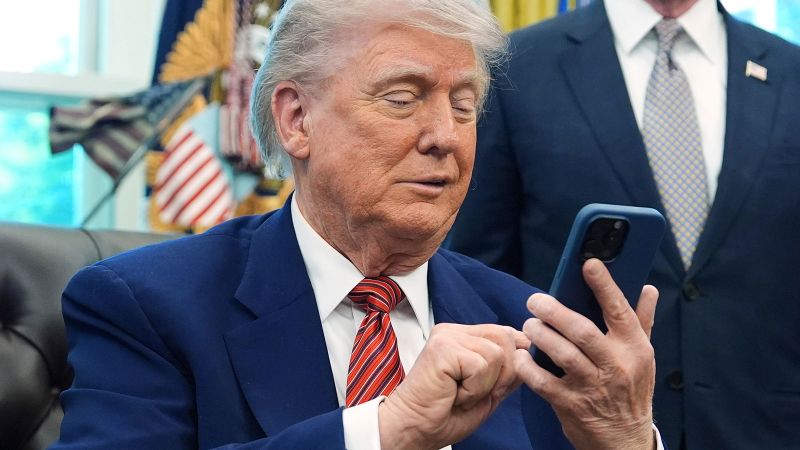Celebrities have long put their names on everything from shoes to cosmetics tosnacks. Now, they’re attaching their brand to mobile phone networks.
Trump Mobile, announced on Monday, is the latest cellular service pegged to a high-profile figure, joining the likes of wireless services from actors such asJason BatemanandRyan Reynolds. Major carriers are no longerthe only ones cashing in on the airwaves that power the devices in our pockets. Comedians, sports teams and retailers have launched their own mobile networks as the technology has become more accessible to companies outside the telecoms sp
Instead of building their own networks, these providers— known as mobile virtual network operators (MVNOs) — lease spectrum from major carriers like Verizon, AT&T and T-Mobile. That makes it easier for anyoneto launch their own network so long asthey canbuy the bandwidth to power it, while providing another way for major carriers to monetize their networks.
MVNO networks aren’t new; Virgin Group founder and entrepreneur Richard Branson launched Virgin Mobile – an MVNO – in 1999. But the recent wave of celebrity-fronted MVNOslikely stems from a couple of trends: a decrease in loyalty to major carriers; technology that facilitates business operations like customer support and billing; and the prevalence of electronic SIM cards that make it easier for consumers to switch plans and carrier services.
Consumers are more faithful to their phones than they are to their carriers, said Michael Levin, an analyst with Consumer Intelligence Research Partners, a firm that studies consumer behavior in the mobile carrier market. That could explain why customers are willing to ditch their legacy carrier for something new.
“The technology made it a little easier to switch. And at the same time, consumers became a lot more loyal to the phone manufacturer,” he said. “And then the carrier was kind of less important.”
Trump Mobile, like other MVNOs, is pitching itself as a more accessible alternative to the big three carriers, Verizon, AT&T and T-Mobile. For $47.45 a month (plus applicable taxes and fees), subscribers get unlimited data, talk and texting, although data speeds are slowed after the first 20GB. Telehealth services and roadside assistance are also included.
“A big part of what we’ve done … has been focused on technology for people who have been underserved, whether that’s been in crypto or anything else, but one of the places where we felt there was lackluster performance was in the mobile industry,” Donald Trump Jr. said an event at Trump Tower in New York on Monday.
The launch comes after actors Jason Bateman, Will Arnett and Sean Hayes last week launched a mobile service calledSmartLess Mobile, named after the trio’s popular podcast. SmartLess Mobile is intended to provide cheap capped data plans for consumers, since many people spend most of their time on Wi-Fi networks, SmartLess MobileCEO Paul McAleese previously told CNN.
“Deadpool” actor Ryan Reynoldspurchased an ownership stakein MVNO Mint Mobile in 2019. He’s been the face of the network since then, even though T-Mobile bought the carrierfor $1.35 billion in 2023.
While AT&T, Verizon and T-Mobile are the dominant players in the US mobile market, there is some data to suggest MVNO networks are growing. Consultancy groupOpensignalfound that MVNOs are consistently gaining more bring-your-own-device subscribers than they lose, unlike traditional network providers.
Even though plans from MVNOs may not always be cheaper than those from mainstream carriers, they often offer compelling promotions.
“You get this very exciting offer, for example: three months at $15 a month. But thereafter then you go back to $45,” said Octavio Garcia, a senior research analyst at market research firm Forrester. “But when you are done with three months, there is a new offer that brings you down to $30, not $45.”
These kinds of mobile networks might feel like a relatively new trend in the United States, but they’re common abroad, according to Garcia and Runar Bjørhovde, an analyst at market research firm Canalys.
Walmart Mexico’s Bait MVNO network, for example, has 19.8 million users, according to the company’sfirst quarter resultsreleased in April. In Italy, there’s a mobile network branded after theAC Milan soccer team.
There’s also been a rise in “MVNO-in-a-box services,” or companies that provide a package of offerings like electronic SIM distribution, network access and billing to help clients set up their own MVNO networks. These types of services are growing, withJuniper Researchestimating that global revenue from MVNO-in-a-box services will surpass $1 billion in 2029.
“To see that it’s easier to set up MVNO as a smaller company, I think it’s a sign of a telecom industry that’s moving in a certain direction,” said Bjørhovde.
